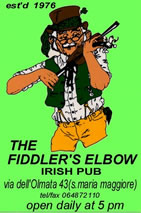Decent homegrown bands are in short supply in Rome. Perhaps i Cani are the most likely to please non-Italian ears. Even if you can’t understand their satirical lyrics, mocking Italian hipsters and the drug-dealing antics of the young and the spoilt of Rome, anyone can appreciate their ear-grabbing electro-pop.
Decent homegrown bands are in short supply in Rome. Perhaps i Cani are the most likely to please non-Italian ears. Even if you can’t understand their satirical lyrics, mocking Italian hipsters and the drug-dealing antics of the young and the spoilt of Rome, anyone can appreciate their ear-grabbing electro-pop.

When you think of the musical capitals of Europe, Rome is not one of them. It is just not. Berlin, Paris, London – yes. But Rome? No. Why not? Well, there are a couple of possible reason: number one is that, despite being a capital city, many people would argue (including just about every Milanese you will ever meet) that Milan is the real cultural capital of Italy. Number two is that Italian music in general is not exactly renowned for being inventive, per say, and Rome is a relatively small city that takes pride in its history and tradition. As you can imagine, this doesn’t exactly make for fertile ground on which to sow the seeds of groundbreaking musical creativity. But, even though the Roman music scene is hardly dynamic, there are some ways to escape the musical famine- you just have to think outside the box a little bit…
Clubbing: There are a few things that you need to know before going out and painting Rome red. Unlike uncouth Anglophones, Romans, like most Italians, have a horror of the so-called brutta figura, which means to look foolish or make a bad impression. Consequently, they do not as a general rule like to get too inebriated. Many clubs will charge you an entrance fee of at least ten euro, which includes one drink- and it is expected that you will not drink much more than this.
There are certain times and places where Italians will conquer their fear of the brutta figura. At one AM on Via Monte Testaccio, in a former industrial district of the city, is one of them. Here you will find the Roman “strip”. The “strip” is a cluster of ramshackle establishments, clubs- and I use the word loosely- which look more like some kind of shanty town, huts made from corrugated iron with Perspex windows. On entering, you will be surprised to discover that some of these venues did indeed use bricks in their construction. As for the music, well, everyone knows what Euro-house sounds like. There is one “alternative club” of the strip, Muzak, but that is generally populated by a DJ and one man performing an electrifying air guitar solo.
To experience a typically civilised Roman night out, try the chic cocktail bar Salotto 42, which generally plays relaxed jazz by day moves up tempo in the evening, or the understatedly cool Bar Del Fico, which has decor inspired by the Parisian Metro. The music is hip- but don’t think you will hear it over the crowd!
Gigs: Decent homegrown bands are in short supply in Rome. Perhaps i Cani are the most likely to please non-Italian ears. Even if you can’t understand their satirical lyrics, mocking Italian hipsters and the drug-dealing antics of the young and the spoilt of Rome, anyone can appreciate their ear-grabbing electro-pop.
International acts are more likely to be spotted playing venues like il Circolo degli artisti, il Circolo degli illuminati (no, it’s in no way related to any Dan Brown novel) or Black Market club (in no way related to the mafia). Rome is often second choice for artists coming to Italy – Milan draws a far wider selection of international acts- but all hope is not lost! Alternative electro seems to have a small but devoted following here, enough to draw at least some names to the city, what with We Have Band and Teen Daze having played Rome in the past few months.
Alternatives: Branching out is often the best way to glean the most from the city’s meagre musical harvest. When you look beneath the surface, all kinds of unexpected genres are represented in Rome. Irish folk music is one of them. Italians are more than willing to get onboard with Saint Patricks Day (it is a saint’s day, after all, and one that provides them with a semi-legitimate excuse to drink heavily and leave behind the fear of the brutta figura), when you will see Irish music concerts all over the city. But the music doesn’t just disappear with the Guinness hats. The Fiddler’s Elbow is one of a number of Irish bars in the city – and what a bastion of Irish culture it is! It holds a stomping folk night every Tuesday.
Or you could go retro. Micca Club holds swing aperitivi, where you can grab a drink, a bite to eat, learn to Lindy Hop and dance the night away vintage style. Their Friday I’m in Love club night, surprisingly, is not an 80s night, but instead plays groovy doo-wop and Motown till the wee small hours.
